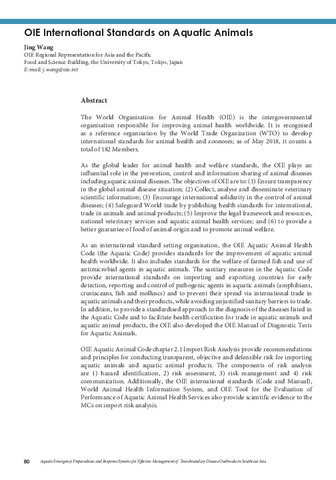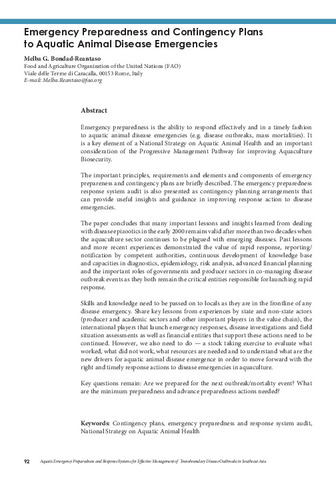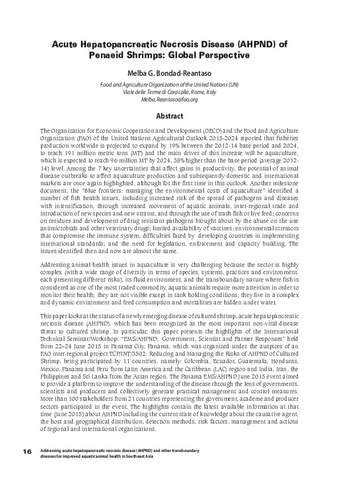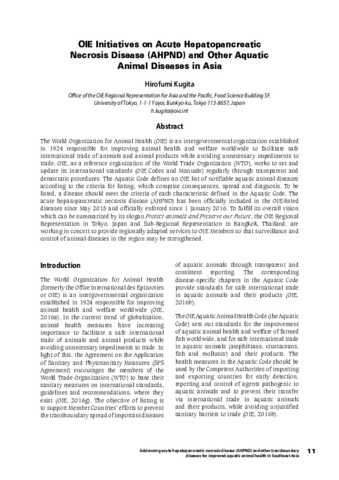OIE international standards on aquatic animals
- Global styles
- MLA
- Vancouver
- Elsevier - Harvard
- APA
- Help

Date
2019Author
Page views
2,679ASFA keyword
disease control 
disease recognition
disease resistance
disease transmission
epidemiology
husbandry diseases
aquaculture regulations
quarantine regulations
fish culture
fish diseases
standards
aquatic animals
aquatic organisms
animal diseases
fishery organizations
international organizations
analysis
information systems
fish
trade organizations
aquatic crustaceans
organizations
communication
risk management
aquatic reptiles
trade
risk
control methods
animal welfare
pathogens
detection
world
animal products
products

disease recognition

disease resistance

disease transmission

epidemiology

husbandry diseases

aquaculture regulations

quarantine regulations

fish culture

fish diseases

standards

aquatic animals

aquatic organisms

animal diseases

fishery organizations

international organizations

analysis

information systems

fish

trade organizations

aquatic crustaceans

organizations

communication

risk management

aquatic reptiles

trade

risk

control methods

animal welfare

pathogens

detection

world

animal products

products

Metadata
Show full item record
Share
Abstract
The World Organisation for Animal Health (OIE) is the intergovernmental organisation responsible for improving animal health worldwide. It is recognised as a reference organisation by the World Trade Organization (WTO) to develop international standards for animal health and zoonoses; as of May 2018, it counts a total of 182 Members.
As the global leader for animal health and welfare standards, the OIE plays an influential role in the prevention, control and information sharing of animal diseases including aquatic animal diseases. The objectives of OIE are to: (1) Ensure transparency in the global animal disease situation; (2) Collect, analyse and disseminate veterinary scientific information; (3) Encourage international solidarity in the control of animal diseases; (4) Safeguard World trade by publishing health standards for international, trade in animals and animal products; (5) Improve the legal framework and resources, national veterinary services and aquatic animal health services; and (6) to provide a better guarantee of food of animal origin and to promote animal welfare.
As an international standard setting organisation, the OIE Aquatic Animal Health Code (the Aquatic Code) provides standards for the improvement of aquatic animal health worldwide. It also includes standards for the welfare of farmed fish and use of antimicrobial agents in aquatic animals. The sanitary measures in the Aquatic Code provide international standards on importing and exporting countries for early detection, reporting and control of pathogenic agents in aquatic animals (amphibians, crustaceans, fish and molluscs) and to prevent their spread via international trade in aquatic animals and their products, while avoiding unjustified sanitary barriers to trade. In addition, to provide a standardised approach to the diagnosis of the diseases listed in the Aquatic Code and to facilitate health certification for trade in aquatic animals and aquatic animal products, the OIE also developed the OIE Manual of Diagnostic Tests for Aquatic Animals.
OIE Aquatic Animal Code chapter 2.1 Import Risk Analysis provide recommendations and principles for conducting transparent, objective and defensible risk for importing aquatic animals and aquatic animal products. The components of risk analysis are 1) hazard identification, 2) risk assessment, 3) risk management and 4) risk communication. Additionally, the OIE international standards (Code and Manual), World Animal Health Information System, and OIE Tool for the Evaluation of Performance of Aquatic Animal Health Services also provide scientific evidence to the MCs on import risk analysis.
Suggested Citation
Wang, J. (2019). OIE international standards on aquatic animals. In E. A. Tendencia, L. D. de la Peña, & J. M. V. de la Cruz (Eds.), Aquatic Emergency Preparedness and Response Systems for Effective Management of Transboundary Disease Outbreaks in Southeast Asia: Proceedings of Asean Regional Technical Consultation, 20-22 August 2018, Centara Grand Central Ladprao, Bangkok, Thailand (p. 80). Tigbauan, Iloilo, Philippines: Aquaculture Department, Southeast Asian Fisheries Development Center.
Type
Conference paperISBN
9789719931089
Related items
Showing items related by title, author, creator and subject.
-
Emergency preparedness and contingency plans to aquatic animal disease emergencies
Bondad-Reantaso, Melba G. (Aquaculture Department, Southeast Asian Fisheries Development Center, 2019)Emergency preparedness is the ability to respond effectively and in a timely fashion to aquatic animal disease emergencies (e.g. disease outbreaks, mass mortalities). It is a key element of a National Strategy on Aquatic ... -
Acute hepatopancreatic necrosis disease (AHPND) of penaeid shrimps: Global perspective
Bondad-Reantaso, Melba G. (Aquaculture Department, Southeast Asian Fisheries Development Center, 2016)The Organization for Economic Cooperation and Development (OECD) and the Food and Agriculture Organization (FAO) of the United Nations Agricultural Outlook 2015-2024 reported that fisheries production worldwide is projected ... -
OIE initiatives on acute hepatopancreatic necrosis disease (AHPND) and other aquatic animal diseases in Asia
Kugita, Hirofumi (Aquaculture Department, Southeast Asian Fisheries Development Center, 2016)The World Organization for Animal Health (OIE) is an intergovernmental organization established in 1924 responsible for improving animal health and welfare worldwide to facilitate safe international trade of animals and ...




